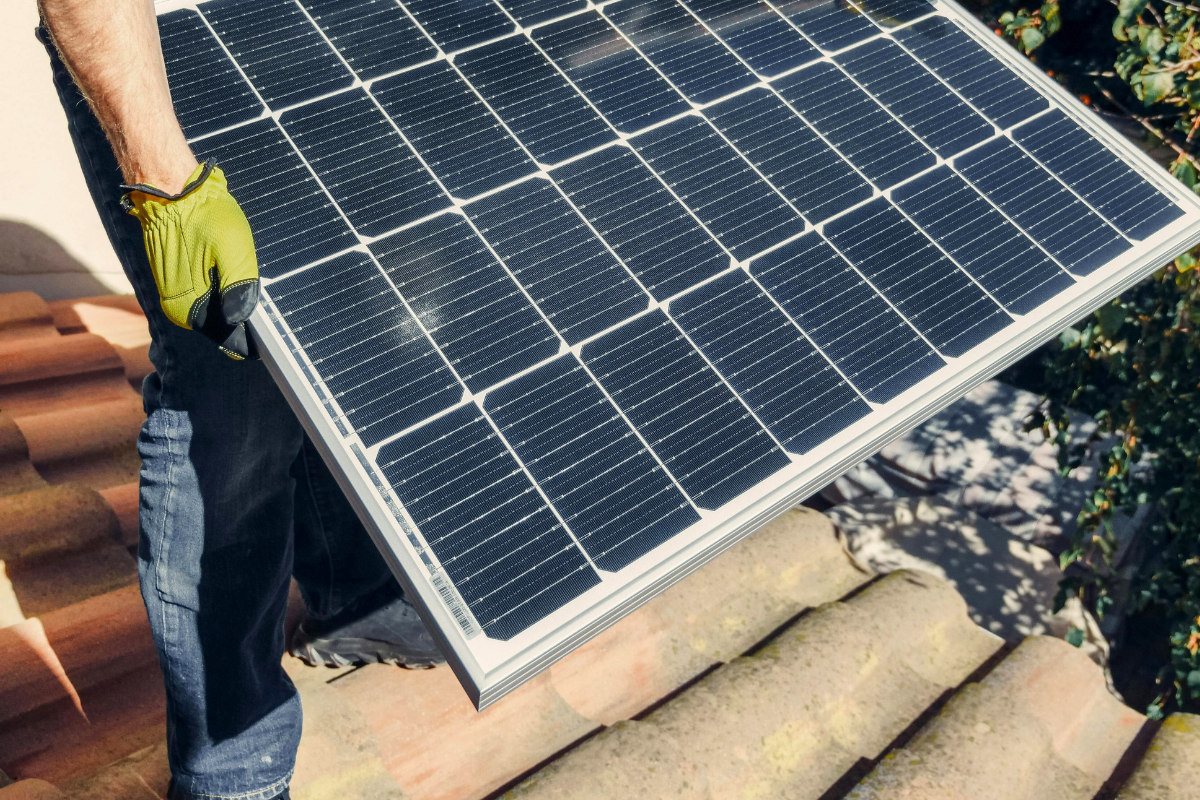We’re noticing that solar panels are no longer a fringe technology, but slowly, they’re becoming a mainstream solution. Rising energy costs, ESG pressure, and the need to achieve better EPC ratings make solar panels for commercial buildings a smart investment. But knowing whether your site is suited for solar, and how to implement solar power effectively, requires strategic guidance. Our article breaks down why you should be interested in solar energy, and the practical way to get started with installation and maintenance of solar panels.

Solar panels offer a direct route to energy cost reduction and sustainability. With grid prices rising and environmental regulations tightening, more commercial property owners are seeking reliable, long-term solutions. Solar energy delivers exactly that.
Solar panels often stand out for their potential to:
Reduce energy bills significantly by generating onsite electricity
Improve building EPC ratings, which are a key driver in leasing and resale value
Support ESG commitments, which are increasingly vital for investors and corporate tenants
Mitigate carbon emissions, contributing to net-zero goals
Not every commercial building is suitable, and that’s where due diligence matters. As M&E consultants, we help clients assess viability through structured solar feasibility studies. Here are the key factors we look at:
Roof Orientation & Condition: South-facing or flat roofs with minimal shading are ideal.
Structural Load-Bearing Capacity: The roof must handle the weight of panels and racking systems.
Energy Use Profile: Solar works best when electricity use aligns with daylight hours; think offices, retail, and logistics spaces.
Grid Export Potential: Can you sell excess energy back to the grid, or do you need storage?
A professional audit will give you clear ROI insights and help avoid costly missteps. Get in touch for a solar feasibility assessment or to discuss low-carbon strategy support.
Installing solar panels on a commercial building is a strategic decision, and a project that requires technical foresight, planning permission awareness, and careful financial analysis. If you’re overseeing multi-tenant or mixed-use buildings, the process can influence everything from lease agreements to service charge allocations. That’s why a feasibility study should be an essential first step. This assesses energy usage patterns, roof structure, electrical infrastructure, and ROI timelines.
Planning permission isn’t always required in the UK for rooftop installations, especially under Permitted Development Rights, but this depends on the building’s location and listing status. Conservation areas, listed properties, or buildings exceeding specific panel height restrictions often need formal planning applications. It's always advisable to verify local planning rules early in the process.
Additionally, it’s vital to work with an MCS-certified solar installer who understands commercial setups and can provide performance guarantees. Electrical upgrades or Distribution Network Operator (DNO) approvals might be necessary if you're exporting excess power to the grid. Karsons can also support your tendering and contractor vetting process to ensure all technical, compliance, and cost factors are considered.

We often hear a few recurring concerns from property managers and landlords when considering solar. Here’s what you really need to know:
Yes, absolutely. While the UK isn’t known for constant sunshine, solar panels don’t need direct sunlight to generate electricity. They operate on daylight, not heat. Modern systems perform reliably even on cloudy days, and commercial rooftops tend to offer the scale needed to generate meaningful returns year-round.
While there is an initial investment, commercial buildings often benefit from economies of scale, and the ROI timeline can be as short as 6–8 years, especially with rising energy costs. Funding options like leasing or Power Purchase Agreements (PPAs) can also eliminate upfront costs entirely.
Yes. Solar energy can reduce service charge allocations for common areas or be sub-metered for tenant billing. It can also enhance EPC ratings, increasing rental and resale value - so whether tenants or landlords use the energy, everyone benefits.
Not at all. As covered earlier, solar systems are low-maintenance and long-lasting, usually 25 years or more. A structured maintenance schedule ensures optimal performance and integrates easily into your existing building services management plan.
While it’s true that solar panels are relatively low maintenance, neglecting their upkeep can significantly reduce performance, thus impacting your long-term return on investment. Integrating solar PV systems into your Planned Preventive Maintenance (PPM) regime is key to maximising efficiency and extending asset life.
We recommend a proactive maintenance approach. This includes annual inspections of panel surfaces for debris or soiling, especially in urban environments with dust, pollution, or nearby construction. Dirt can reduce solar efficiency by 5–15%, and regular cleaning can prevent long-term degradation. Additionally, visual checks of mounting systems and wiring help prevent faults or safety issues, particularly after high winds or storms.
Inverter health is another essential component.This is often the first point of failure in a solar setup. Monitoring systems should be configured to alert you to dips in performance, allowing for early diagnosis. With commercial systems, remote performance monitoring is a necessity.
By incorporating solar into your asset register and lifecycle planning, you treat it like any other critical system, such as HVAC or lighting. That’s how our clients maintain consistent output, reduce downtime, and maximise energy cost savings across multi-site portfolios.
Solar panels are both about sustainability and strategy for optimal asset performance. Their merits hinge on successful implementation and tailored guidance. Feasibility studies, planning permissions, project management and guidance on ongoing maintenance will ensure your investment into solar reaps good benefits.
Karsons Consulting are members of the Chartered Institute of Building Services Engineers, The Association of Consultancy and Engineering, British Institute of Facilities Managers and the Building Services Research and Information Association.